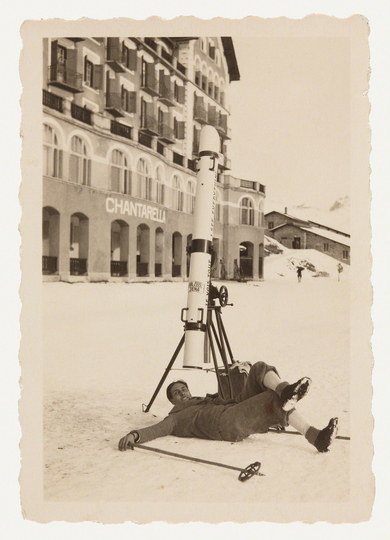Ulrich Becher
For good or ill, we Europeans in exile –those of us who speak and write German – are beneath all global politics (this has been the case so far, let us not delude ourselves!) and therefore all consideration; this places us under an obligation to give testimony.
Ulrich Becher in a letter to Balder Olden, 4 July 1943
| Born | 2 January 1910 in Berlin, Germany |
|---|---|
| Died | 15 April 1990 in Basel, Switzerland |
| Exile | Austria, Switzerland, Brazil, United States of America |
| Remigration | Switzerland |
| Profession | Writer |
*** Please also visit the special exhibition Ulrich Becher ***
When the Nazis took power in Germany in the spring of 1933, Ulrich Becher was at the beginning of a promising career as a writer. He was just 23 years young when – according to his own recollections – his first published work, the well-received collection of novellas Männer machen Fehler (Men Make Mistakes), published in 1932 by Rowohlt, fell victim to the Nazi book burnings of 10 May 1933. By that time, Becher had already left the country: “As Germany’s youngest ‘degenerate author’ and the youngest member of the George Grosz circle, I left Germany during the night of the Reichstag fire in ‘33, not on ‘racist grounds’ but to avoid being taken into protective custody.” George Grosz, whose graphic design student Becher had been since 1927, was to remain a lifelong friend.
Between 1933 and 1938, Becher lived mostly in Austria but also spent time in Switzerland. In the autumn of 1933, he married Dana Roda, daughter of Austrian humorist Alexander Roda Roda, in Vienna. Plans for the Berlin première of his work Niemand (Nobody) fell through, as a result of which the ‘modern mystery play’ was not performed until 1936, when it was staged at the Stadttheater in Bern. The collection of short stories titled Die Eroberer. Geschichten aus Europa (The Conquerors. Stories from Europe) was published in 1936 by Oprecht Verlag, Zurich, with a foreword by Ernst Glaeser which the author himself refused to recognise.
After the “annexation” of Austria, Ulrich and Dana Becher moved on to Switzerland, where they lived in the Engadine. Becher’s impressions of this time later flowed into his main work, the great exile novel Murmeljagd (The Woodchuck Hunt, 1969). Although his mother Elise Becher-Ulrich was Swiss, the author was unable to obtain permanent leave to remain. Thanks to a Czechoslovakian passport, Becher was finally able to flee from Europe to Brazil with the Goergen group. Three years of exile in Brazil were followed by four more productive years in New York before the Becher family (son Martin had been born in 1944) remigrated to Europe and settled permanently in Basel from 1954. There Becher lived in an apartment building until his death on 15 April 1990.
Some of the themes – if not the core theme – of Ulrich Becher’s work include the experience of exile and fierce criticism of the era of dehumanisation that manifested itself in the wars and catastrophes of the 20th century. This is reflected by works such as Der Bockerer (Bockerer), Samba, the New Yorker Novellen (New York Novellas) and novels such as Kurz nach 4 (Just After 4), William’s Ex-Casino and – last but not least – Murmeljagd.
Ulrich Becher’s estate is equally divided between the Swiss Literary Archives in Bern and the German Exile Archive in Frankfurt am Main.
Further literature:
Ulrich Becher. Quarto. Zeitschrift des Schweizerischen Literaturarchivs 29 (2009). Hg. von Ulrich Weber.
Becher, Martin Roda: Dauergäste. Meine Familiengeschichte. Zürich: Nagel & Kimche 2000.
Wagner, Moritz: Nachwort. In: Ulrich Becher: New Yorker Novellen. Ein Zyklus in drei Nächten. Hg. von Moritz Wagner. Frankfurt am Main: Schöffling & Co. 2020, S. 383–404.
Zeller, Nancy McClure: Ulrich Becher. In: Deutschsprachige Exilliteratur seit 1933. Bd. 2: New York. Teil 1. Hg. von John M. Spalek und Joseph Strelka. Bern: A. Francke Verlag 1989, S. 51–67.
Selected works:
Männer machen Fehler (Erzählungen, 1932)
Der Bockerer. Tragische Posse (Drama, 1946; zusammen mit Peter Preses)
Nachtigall will zum Vater fliegen. Ein Zyklus Newyorker Novellen in vier Nächten (1950)
Kurz nach 4 (Roman, 1957)
Murmeljagd (Roman, 1969)

